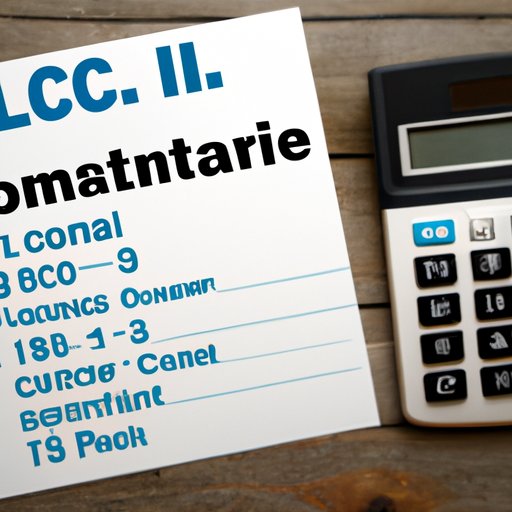Introduction
A limited liability company (LLC) is a type of legal entity that offers its owners protection from personal liability for business debts and obligations. It is a popular choice among small business owners because it provides the same limited liability protection as a corporation while avoiding the complex recordkeeping and double taxation associated with corporations. But what are the costs associated with setting up an LLC? This article will provide an in-depth look at the benefits and costs of forming an LLC.

Calculating the Cost of Starting an LLC
The cost of starting an LLC varies from state to state. Generally speaking, however, the total cost includes filing fees, annual fees, and other miscellaneous expenses such as registered agent services and business licenses. Here’s a closer look at the fees involved in forming an LLC:
What are the Fees Involved in Forming an LLC?
The most significant fee involved in forming an LLC is the filing fee. This is the fee charged by the state government to process the paperwork required to form the LLC. Filing fees vary from state to state but typically range between $50 and $500. Additionally, some states charge an annual fee to maintain the LLC’s status, which can range from $20 to $800 per year.
How Much Does it Cost to Establish an LLC?
The total cost of establishing an LLC depends on the state in which the LLC is formed. On average, the total cost of forming an LLC is around $400-$1,000. This includes filing fees, annual fees, and other miscellaneous expenses. The cost may also be higher if you choose to hire a professional to help you set up the LLC.
The Benefits of Forming an LLC and How Much it Costs
Forming an LLC has many benefits, including limited liability protection, tax advantages, and greater flexibility in management and operations. Let’s take a closer look at the financial implications of setting up an LLC and the tax advantages of forming one.
Financial Implications of Setting Up an LLC
One of the primary benefits of forming an LLC is limited liability protection. This means that the LLC’s owners are not personally liable for the company’s debts or obligations. This can be especially beneficial for business owners who want to protect their personal assets from creditors and lawsuits. Additionally, forming an LLC can help reduce the amount of taxes the business owes since the LLC is treated as a separate entity for tax purposes.
Tax Advantages of Forming an LLC
LLCs offer several tax advantages, including the ability to choose pass-through taxation. With this type of taxation, the LLC’s profits and losses are “passed through” to the owners and reported on their individual tax returns. This helps to avoid the double taxation associated with corporations. Additionally, LLCs can elect to be taxed as S Corporations, which allows them to take advantage of certain tax deductions and credits.
A Step-by-Step Guide to Starting an LLC
Once you’ve decided to form an LLC, the next step is to gather the information and documents required to complete the process. Here’s a step-by-step guide to getting started:
Gathering Required Information
The first step is to gather the information and documents required to form the LLC. This includes the name and address of the LLC, the names and addresses of the members, and the purpose of the LLC. Additionally, you will need to decide on a business structure, such as sole proprietorship, partnership, or corporation.
Filing the Articles of Organization
Once you’ve gathered the necessary information, the next step is to file the Articles of Organization with the state in which the LLC will be established. This document outlines the basic information about the LLC, such as its name, members, and purpose. The filing fee varies from state to state.
Obtaining an EIN
An Employer Identification Number (EIN) is required to open a bank account and pay taxes. You can obtain an EIN by filing Form SS-4 with the IRS. This is a free service and can be done online or by mail.
Registering Your Business Name
Once you have obtained an EIN, you must register your business name with the state in which the LLC will be established. This is done by filing a DBA (Doing Business As) form with the Secretary of State. The filing fee varies from state to state.
Complying with Other State Requirements
The final step is to comply with any other state requirements. These can include obtaining licenses and permits, registering for local taxes, and filing annual reports. Depending on the type of business, you may also need to obtain additional insurance.
Conclusion
Forming an LLC can be a great way to protect your business and take advantage of certain tax benefits. The costs associated with setting up an LLC vary from state to state but generally include filing fees, annual fees, and other miscellaneous expenses. By understanding the benefits and costs of forming an LLC, you can make an informed decision about whether it’s the right choice for your business.
(Note: Is this article not meeting your expectations? Do you have knowledge or insights to share? Unlock new opportunities and expand your reach by joining our authors team. Click Registration to join us and share your expertise with our readers.)
